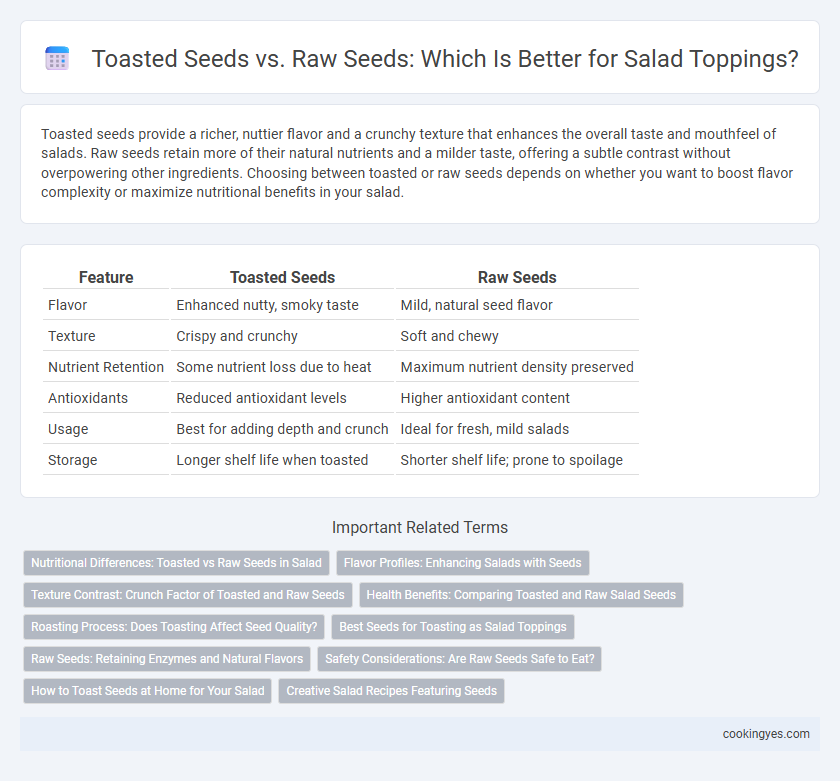Toasted seeds provide a richer, nuttier flavor and a crunchy texture that enhances the overall taste and mouthfeel of salads. Raw seeds retain more of their natural nutrients and a milder taste, offering a subtle contrast without overpowering other ingredients. Choosing between toasted or raw seeds depends on whether you want to boost flavor complexity or maximize nutritional benefits in your salad.
Table of Comparison
| Feature | Toasted Seeds | Raw Seeds |
|---|---|---|
| Flavor | Enhanced nutty, smoky taste | Mild, natural seed flavor |
| Texture | Crispy and crunchy | Soft and chewy |
| Nutrient Retention | Some nutrient loss due to heat | Maximum nutrient density preserved |
| Antioxidants | Reduced antioxidant levels | Higher antioxidant content |
| Usage | Best for adding depth and crunch | Ideal for fresh, mild salads |
| Storage | Longer shelf life when toasted | Shorter shelf life; prone to spoilage |
Nutritional Differences: Toasted vs Raw Seeds in Salad
Toasted seeds provide enhanced flavor and crunch but may have slightly reduced heat-sensitive nutrients like vitamin E and certain antioxidants compared to raw seeds. Raw seeds retain their full nutrient profile, including enzymes and omega-3 fatty acids, which can be partially degraded during the toasting process. Both forms offer beneficial minerals such as magnesium, zinc, and iron, making them valuable salad toppings with varied nutritional impacts based on preparation.
Flavor Profiles: Enhancing Salads with Seeds
Toasted seeds offer a rich, nutty flavor and a satisfying crunch, elevating salad texture and enhancing overall taste complexity. Raw seeds provide a milder, earthier profile that allows fresh vegetable flavors to shine without overpowering. Choosing between toasted and raw seeds depends on desired flavor intensity and textural contrast within the salad.
Texture Contrast: Crunch Factor of Toasted and Raw Seeds
Toasted seeds offer a crunchy, robust texture that enhances salad toppings by providing a satisfying contrast to softer greens. Raw seeds maintain a delicate, mild crunch that blends subtly without overpowering the salad's crispness. Incorporating toasted seeds elevates the overall crunch factor, adding depth and a toasty flavor profile to fresh salads.
Health Benefits: Comparing Toasted and Raw Salad Seeds
Toasted seeds offer enhanced flavor and improved digestibility due to the breakdown of antinutrients, which can increase nutrient absorption compared to raw seeds. Raw seeds retain more heat-sensitive vitamins like vitamin E and certain antioxidants, preserving their natural enzyme activity and maximum nutrient density. Selecting between toasted and raw seeds for salad toppings depends on balancing nutrient bioavailability with vitamin preservation to optimize health benefits.
Roasting Process: Does Toasting Affect Seed Quality?
Toasting seeds enhances their flavor and aroma by triggering Maillard reactions that develop complex, nutty notes, making them a superior choice for salad toppings. However, excessive heat during the roasting process can degrade sensitive nutrients such as unsaturated fats, vitamins, and antioxidants found in raw seeds, potentially reducing their overall nutritional value. Lightly toasted seeds strike an optimal balance, preserving essential nutrients while improving texture and taste, which elevates the sensory experience of salads.
Best Seeds for Toasting as Salad Toppings
Toasted seeds like pumpkin, sunflower, and sesame offer enhanced crunch and richer flavor profiles compared to raw seeds, making them superior choices for salad toppings. Toasting these seeds brings out natural oils and intensifies their nuttiness, contributing to a more satisfying texture and taste. Pumpkin seeds, in particular, are prized for their high antioxidant content and pairing well with leafy greens and citrus dressings.
Raw Seeds: Retaining Enzymes and Natural Flavors
Raw seeds preserve essential enzymes that aid digestion and maintain their natural, vibrant flavors ideal for fresh salad toppings. The unaltered nutritional profile, including antioxidants and healthy fats, remains intact, providing maximum health benefits. Incorporating raw seeds enhances the salad's texture with a subtle crunch without the bitterness sometimes imparted by toasting.
Safety Considerations: Are Raw Seeds Safe to Eat?
Raw seeds such as pumpkin, sunflower, and flax seeds are generally safe to eat in salads but may carry a slight risk of contamination with bacteria or mold if not stored or handled properly. Toasting seeds enhances safety by reducing microbial load through heat exposure, while also improving flavor and crunch, though it may reduce some heat-sensitive nutrients. For optimal safety, consume fresh raw seeds from reputable sources and consider toasting if concerned about potential pathogens.
How to Toast Seeds at Home for Your Salad
Toasting seeds enhances their flavor and crunch, making them a perfect salad topping. To toast seeds at home, spread them in a single layer on a dry skillet over medium heat, stirring frequently for 3-5 minutes until golden and fragrant. Allow the seeds to cool before sprinkling them onto your salad for added texture and a nutty taste.
Creative Salad Recipes Featuring Seeds
Toasted seeds enhance salad toppings by providing a deeper, nutty flavor and a satisfying crunch compared to raw seeds, which offer a milder taste and softer texture. Creative salad recipes often combine toasted pumpkin, sunflower, or sesame seeds with fresh greens, roasted vegetables, and tangy dressings to add complexity and nutritional benefits. Incorporating both toasted and raw seeds can elevate salads by balancing flavor intensity and maximizing nutrient absorption, including antioxidants and healthy fats.
Toasted seeds vs raw seeds for salad toppings Infographic

 cookingyes.com
cookingyes.com